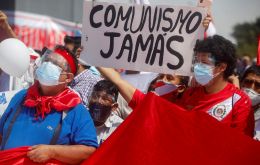MercoPress. South Atlantic News Agency
Tag: banks
-
Monday, September 20th 2021 - 08:55 UTC
Bradesco, one of Brazil's top leading banks is leaving Argentina

Bradesco, Brazil's second-largest private bank is ceasing operations in Argentina. Mainly a commercial bank that works with corporations and foreign trade, Bradesco joins a long list of companies that stopped making business in Argentina and have left or are leaving.
-
Thursday, June 17th 2021 - 09:54 UTC
Peru's fortunes start packing up in case Castillo becomes President

Peru's wealthiest people feel threatened by the likelihood of leftwing Pedro Castillo becoming the next president and have therefore started wiring money abroad, it was reported.
-
Monday, March 18th 2019 - 08:39 UTC
Germany's two leading banks considering a merger: government supports

Germany's two biggest lenders, Deutsche Bank and Commerzbank, will hold formal talks about a merger. The announcement caps months of speculation that the two struggling banks would attempt to combine.
-
Saturday, January 5th 2019 - 08:59 UTC
New Brazilian administration prepared to open concentrated banking to foreign competition

The fast pace of Brazilian president Jair Bolsonaro continued on Friday, with current central bank Governor Ilan Goldfajn telling newspaper Valor Economico that the new administration is likely to empower the central bank to approve the entrance of new foreign lenders into Brazil.
-
Tuesday, January 2nd 2018 - 10:58 UTC
Brexit: First quarter of 2018, “point of no return” for financial services industry

The clock is ticking for the financial services industry, with banks said to be months away from being forced to act on Brexit contingency plans that could see thousands of jobs leave the UK. The first quarter of 2018 has been dubbed the “point of no return” for banks, insurers and asset managers as the industry calls on the UK to clinch a transition period that would extend market access to the EU beyond March 2019.
-
Thursday, March 15th 2012 - 00:23 UTC
All but four of US main banks pass ‘strain test’; Citi among the failed

All but four of 19 major United States banks got a green light yesterday to boost dividends and buy back shares after the Federal Reserve declared them strong enough to survive another serious recession.
-
Wednesday, December 21st 2011 - 00:45 UTC
UK readies plan for ex-pats evacuation in the event of Spain and Portugal banking collapse

Gibraltar could play a role in contingency plans drawn up by the Foreign Office to evacuate British expatriates in the event of a banking collapse in Spain and Portugal, according to the Sunday Times.
-
Friday, December 16th 2011 - 06:32 UTC
Fitch downgrades the credit rating of the world’s six largest banks

Fitch announced on Thursday it has downgraded the credit rating of six of the world’s largest banks. The banks include US’ Bank of America, British Barclays, and France’s BNP Paribas.
-
Wednesday, October 26th 2011 - 13:49 UTC
Top bankers praise Latam’s performance but beware effects of Euro crisis

Latin America is in a good financial situation, but the problems currently being suffered by the US and Europe poses a threat, according to the region’s banks federation, FELEBAN.
-
Thursday, February 17th 2011 - 01:58 UTC
Brazil injects 27 billion USD to subsidized-loans development bank

Brazilian state-run development bank BNDES will receive at least 45 billion Real or 27 billion US dollars from the government to extend its program of low-cost loans for supporting company investments in capital goods, local media reported this week.
